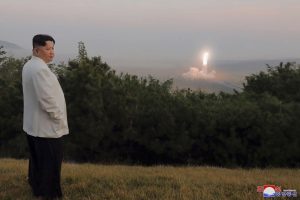North Korea launched two short-range ballistic missiles (SRBMs) toward the waters off its east coast on Sunday, South Korea’s Joint Chiefs of Staff (JCS) said.
The missiles flew roughly 350 km with an altitude of 90 km and were fired between 1:48 a.m. and 1:58 a.m. from Munchon in Kangwon province. Considering the performance of the missiles, North Korea likely tested its KN-25 SRBMs.
Sunday’s missile test came a day before the 77th anniversary of the Workers’ Party of Korea’s founding. It also came three days after North Korea had fired another two SRBMs into the waters off its east coast.
Overall, North Korea has launched seven rounds of ballistic missile tests since September 25, and 11 rounds since South Korean President Yoon Suk-yeol took office in May.
North Korea has repeatedly launched ballistic missiles since South Korea conducted joint military drills with the United States. The nuclear-powered aircraft carrier USS Ronald Reagan was deployed to the east of South Korea in late September and took part in joint navy exercises. It was the first deployment of the U.S. aircraft carrier in the region since 2017.
In the wake of the North’s IRBM launch on October 4, the U.S. redeployed the USS Ronald Reagan in the region and conducted trilateral defensive military drills with South Korea and Japan to strengthen their capabilities to track and detect the North’s missiles.
Meanwhile, Kim Jong Un, the North Korean leader, guided drills by “tactical nuclear operation units” of the Korean People’s Army (KPA), the North’s state-controlled Korea Central News Agency (KCNA) reported on Monday.
“The busy military moves of the enemies are being focused at this time, too,” KCNA quoted Kim as saying. “…[T]he U.S. and the South Korean regime’s steady, intentional and irresponsible acts of escalating the tension will only invite our greater reaction, and we are always and strictly watching the situation crisis.”
Dismissing Seoul and Washington’s offers of dialogue, Kim said that “we have no content for dialogue with the enemies and felt no necessity to do so,” while stating that the two allies are “posing military threats” to his country.
“[W]e should send a clearer signal to the enemies escalating the regional situation by involving the huge armed forces in any time with more powerful and resolute will and action,” Kim said.
In recent days, North Korea has been stepping up rhetoric framing its latest spate of missile launches as a justified response to the South Korea-U.S. joint drills.
A day before its latest SRBM launches, KCNA published a press statement from a spokesperson for the Ministry of National Defense. Recalling the redeployment of the USS Ronald Reagan near the Korean Peninsula, the spokesperson called it “an event of considerably huge negative splash to the regional situation” and “a sort of military bluffing.” The spokesperson also said that the North’s armed forces “are seriously approaching the extremely worrisome development of the present situation.”
On the same day, KCNA also published a press statement from a spokesperson for the National Aviation Administration (NAA). “The missile test launch by the DPRK is a regular and planned self-defensive step for defending the country’s security and the regional peace from the U.S. direct military threats that have lasted for more than half a century,” the spokesperson said in his statement.
While reporting Kim’s inspection of the military drills, the North Korean state media also released pictures of the drills on Monday. Among the 33 pictures, one picture caught attention from experts: a submarine-launched ballistic missile (SLBM) flying from a reservoir.
The media stated that the eye-catching SLBM was launched from the Taecheon area in North Pyongan province on September 25. Based on its appearance, the missile seems to be the North’s KN-23 series missile; the launch was detected at the time but it was not identified by foreign analysts as an SLBM.
North Korea normally launches its SLBMs from the Sinpo area. Analysts had warned that Pyongyang’s Sinpo Shipyard was preparing to launch SLBMs in the past few weeks. The picture of an SLBM launch from a reservoir in a different area demonstrates that North Korea has expanded its capabilities for such tests.

































